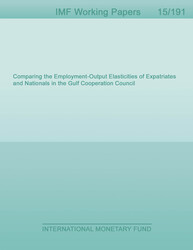
Comparing the Employment-Output Elasticities of Expatriates and Nationals in the Gulf Cooperation Council
We estimate the elasticity of private-sector employment to non-oil GDP in the Gulf Cooperation Council (GCC) for GCC nationals and expatriates using a Seemingly Unrelated Error Correction (SUREC) model. Our results indicate that the employment response is lower for nationals, who have an estimated short-run elasticity of only 0.15 and a long-run response of 0.7 or less. The elasticity is almost unity for expatriates in the long run and 0.35 in the short run. We interpret low elasticities as indirect evidence of labor market adjustment costs, which could include hiring and firing rigidities, skills mismatches, and reluctance to accept private sector jobs. Forecasts suggest that, absent measures to reduce adjustment costs, the private sector will only be able to absorb a small portion of nationals entering the labor force.
Publication date: August 2015
ISBN: 9781513573885
$18.00
Add to Cart by clicking price of the language and format you'd like to purchase
Available Languages and Formats
| English |
Prices in red indicate formats that are not yet available but are forthcoming.
Topics covered in this book
This title contains information about the following subjects.
Click on a subject if you would like to see other titles with the same subjects.
Economics- Macroeconomics , Economics / General , International - Economics , Employment Elasticities , Labor Market Adjustment Costs , GCC , Gulf Cooperation Council , Inclusive Growth
Summary
Copyright © 2010 - 2024
Powered by:
AIDC



